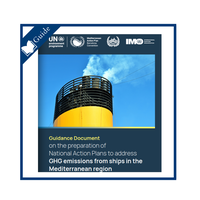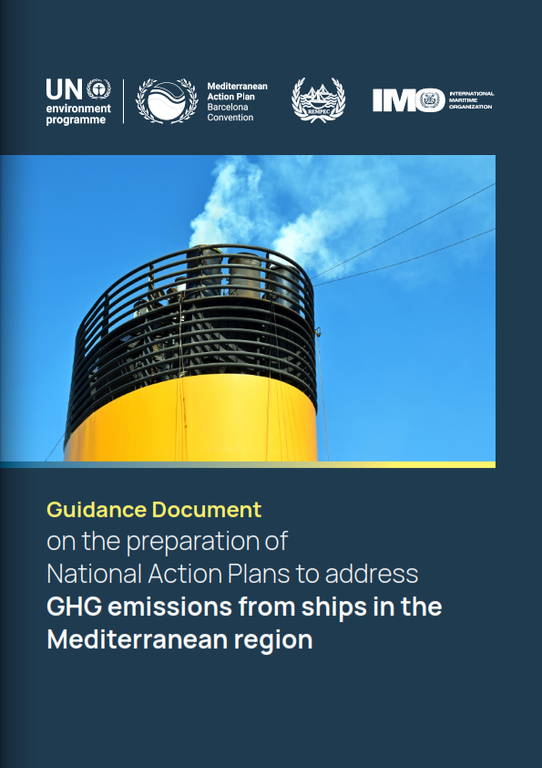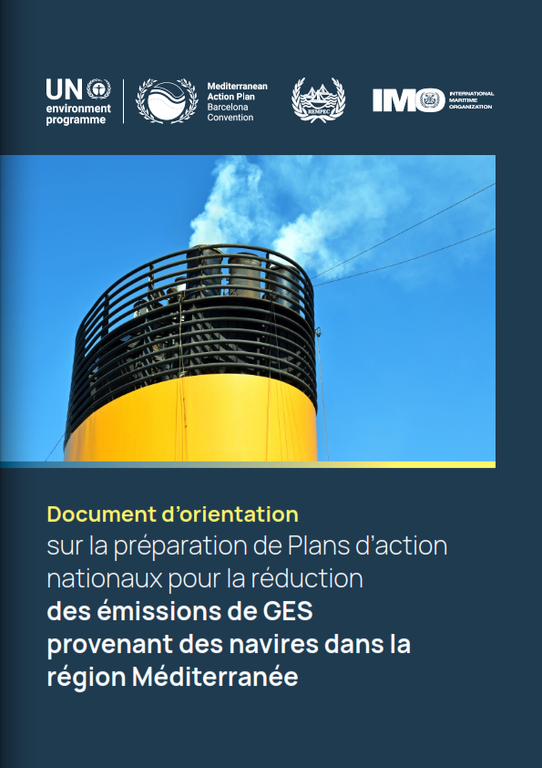Guidance Document on the preparation of National Action Plans to address GHG emissions from ships in the Mediterranean Region – Sep 04, 2025
In 2018, the International Maritime Organisation (IMO) adopted the Initial IMO Strategy on reduction of greenhouse gas (GHG) emissions from ships (hereinafter referred to as the Initial IMO GHG Strategy), which defined the objectives, tools, pace of work and guiding principles and as such was the framework for IMO Member States to decarbonise shipping. Furthermore, in 2020, IMO adopted a Resolution to encourage IMO Member States to develop and submit voluntary National Action Plans (NAPs) to address GHG emissions from ships, which was revised in 2022 to include references to shipping routes to support decarbonisation (Resolution MEPC.367(79)). The latter suggests that NAPs could include but are not limited to:
.1 improving domestic institutional and legislative arrangements for the effective implementation of existing IMO instruments;
.2 developing activities to further enhance the energy efficiency of ships;
.3 initiating research and advancing the uptake of alternative low-carbon and zero-carbon fuels;
.4 encouraging the production and distribution of such fuels for shipping;
.5 accelerating port emission reduction activities, consistent with resolution MEPC.366(79);
.6 fostering capacity-building, awareness-raising and regional cooperation;
.7 facilitating the development of infrastructure for green shipping; and
.8 facilitating voluntary cooperation through the whole value chain, including ports, to create favourable conditions to reduce GHG emissions from ships through shipping routes and maritime hubs consistent with international law, including the multilateral trade regime.
In July 2023, IMO adopted the 2023 IMO Strategy on Reduction of GHG Emissions from Ships (hereinafter referred to as the 2023 IMO GHG Strategy) in accordance with the agreed programme of follow-up actions, which now replaces the Initial IMO GHG Strategy. The 2023 IMO GHG Strategy represents a framework for IMO Member States, setting out the future vision for international shipping, the levels of ambition to reduce GHG emissions and guiding principles; and includes candidate mid- and long-term further measures with possible timelines and their impacts on States. It also identifies barriers and supportive measures including capacity building, technical cooperation as well as research and development (R&D).
The Mediterranean region, with its unique challenges and opportunities, requires tailored approaches for the successful implementation of the 2023 IMO GHG Strategy by Contracting Parties to the Barcelona Convention (CPs), including relevant stakeholders. In line with international commitments to reduce GHG emissions, there is a need for the development of comprehensive NAPs tailored to the specific challenges of the Mediterranean region.
What is the purpose of this Guidance Document?
The Guidance Document was developed to support Contracting Parties to the Barcelona Convention with the preparation of NAPs for the reduction of greenhouse gas (GHG) emissions from ships in the Mediterranean region. NAPs are considered a crucial step to helping a Contracting Party to the Barcelona Convention both identify appropriate climate action but, importantly, to ensure that risks are addressed and opportunities fully exploited. The aim of the Guidance Document on the preparation of National Action Plans to address GHG emissions from ships in the Mediterranean region (this “Guidance Document”) is to provide the following:
1. an overview of existing international and regional regulations, guidelines, and best practices related to the reduction of GHG emissions from ships;
2. the development of a structured framework for NAPs to address GHG emissions from ships, including key elements such as goal setting, stakeholders’ engagement, policy measures, monitoring, reporting, and verification;
3. the provision of practical tools, templates, and examples to support the preparation and implementation of NAPs to address GHG emissions from ships; and
4. the identification and analysis of the specific challenges and opportunities for mitigating GHG emissions from ships in the Mediterranean region.
The Guidance document was endorsed by the Contracting Parties to the Barcelona Convention during the 16th Meeting of the Focal Points of REMPEC, which was held in Malta between the 13 and 15 May 2025.
The Guidelines in both English and French are available to download below.





